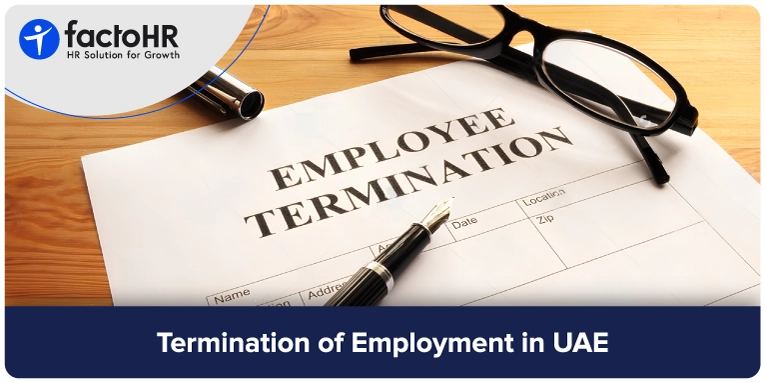Termination of Employment in UAE

Table of Contents
The United Arab Emirates is one of the most popular places to look for a job globally. Hundreds of people visit the UAE every year to improve their employment opportunities. The friendly work atmosphere, good work-life balance, and high pay attract many expats. The UAE’s fair labor rules also benefit both companies and employees. There are different Rules for Termination of Employment in UAE.
Knowing how to end employment in the UAE helps companies and employees manage transitions better. Both workers and employers have specific responsibilities and liabilities when ending employment. Ignoring these rules can lead to legal penalties.
This article provides a complete overview of employment Termination of Employment in the UAE and how labor laws safeguard the rights of all parties involved. Different contracts and ending processes are reviewed. Notice periods, severance pay, and compensation are also covered.
What Is Termination?
In the UAE, the termination of employment involves specific procedures for ending a job, including notice periods, benefits, and dispute resolution methods. These procedures facilitate a smooth transition between employers and employees in the UAE. Distinct laws govern different types of employment contracts.
When employment is terminated, the employer and the employee are no longer working together. Termination can occur if the contract terms are followed by either the employee, employer, or both parties. There are established legal reasons for ending employment without any issues. Failure to adhere to these regulations can result in penalties.
The consequences of terminating employment in the UAE can be severe. These may include employees paying the employers’ compensation earnings and the risk of losing their jobs for up to a year. Employers can face lawsuits and may be required to reinstate employees and provide support to the employees until they receive their first paycheck from a new job.

Legal Circumstances Under Termination
Article 42 of Federal Decree-Law No. 33 of 2021 lists the conditions for terminating employment in the UAE:
- If the employer does not renew or extend the employment contract when it expires.
- When both parties willingly consent to the dissolution of the employment contract/relationship.
- The employer and employee can end the agreement if they agree on the notice period. They must also agree on the work conditions.
- If the employee dies, the employment contract ends. The business will then pay the final settlement to the employee’s family.
- If the employer dies, the employment contract may terminate if tied to its entity.
- When an employee receives a court decision within three months, their job may end.
- The job may end if the organization or business is permanently closed. This is following UAE laws and regulations.
- Employment may be terminated if the employer goes bankrupt or becomes insolvent. It can also end if the organization faces economic difficulties.
Other Grounds Of Termination
Legitimate Grounds
Mutual agreement between employer and employee, with the latter’s approval documented in writing. Non-national employees might face extra costs if they quit under unusual conditions. This can happen even if the employer agrees to the departure.
The contract ends when the established period expires. It can be extended only if both parties agree and follow labor law regulations.
A party can end an indefinite contract by following the specified terms. They must also comply with labor law regulations on notice and valid reasons for contract dissolutions.
Health And Death Circumstances
- A contract stays in effect after the employer’s death unless the initiated agreement directly relates to their life. However, if an employee dies or is entirely incapacitated and has a medical certificate to show it, their job will be ended.
- If a worker is partially incapacitated but can work in another available industry, their employer must reassign them upon request. Reassigned employees are entitled to the compensation and benefits as per the compensation and benefits policy associated with their new positions.
- Employers are not permitted to terminate the employment of ailing or medically unfit employees until they have completed their leave periods. All contractual agreements that violate this labor-mandated law are null and void. Workers are entitled to 90 days of sick leave per year. They are paid fully for the first 15 days, half pay for the next 45 days, and no pay for the final 30 days.
Notice Period
For the Termination of Employment in UAE, Article 43 of the UAE Labour Law states that:
- A formal and written notice is sent to the opposite party.
- Layoff should provide a notice of either 30 or 90 days, depending on the mutual agreement between the employer and the terminating employee. Moreover, there is some truth to the notion that
- During the notice period, the employee will perform the duties in compliance with the employment contract terms.
- The wages that should be paid to the worker during the notice period should be the total wages.
- However, if the employee does not complete their notice period, the notice period allowance must be paid based on the worker’s last wage.
- If the employer dismisses the employee, the employee is allowed one day of unpaid working leave every week throughout the notice period to search for another job.
Both parties can negotiate or waive the notice time based on mutual agreement and talks.
Contract Termination
Employment Contract Termination Without Prior Notice By The Employer
According to Article 44 of the UAE Labour Law, Termination of Employment in UAE and the services of an employee without notice if:
- The employee tenders forged or fraudulent documents to the employer.
- The employee’s negligence leads to him/her giving out sensitive information, which can damage the employer or the company’s property.
- Employer failed to comply with safety standards for employees and the workplace.
- Employee negligently treats the employment contract and neglects to fulfill his obligations by not meeting those contractual provisions even after being warned.
- Employees disclose valuable and sensitive information belonging to the trade or organization to another trader or organization for personal gains.
Termination Of Employment Contract Without Prior Notice By The Employee
According to Article 45 of the UAE Labour Law, the employee may terminate their agreement of employment if the employer:
- Fails to meet the legal obligations to the employee provided by the law. The employee should notify MoHRE 14 working days before quitting the position.
- Assaulted or harassed an employee in the workplace, provided that the MoHRE is notified within 5 working days. Organizations must keep harassment policies in mind in these cases.
- The employer failed to remove workplace hazards that could injure the employee.
Arbitrary Termination
Arbitrary employment ending by an employer is considered if the reasons for the action are unrelated to the job. Arbitrary layoffs are defined as personal grudges between a company and its employees that result in contract dissolution and other related concerns. Workers can register complaints and legal actions with the proper labor authorities and a competent court for compensation.
A competent court can direct the employer to reinstate the employee and compensate him or her for any damages incurred due to the contract ending. The compensation must be, at most, the worker’s three-month wage. Even after compensation is received, any gratuities, benefits, and notices owed to the worker must be paid.

How Can a Complaint Be Raised Against Wrongful Termination?
MOHRE – Ministry of Human Resources and Emiratisation is the legal body that protects the rights of all employees in the UAE. According to the UAE Labour Laws, every legally serving worker in the UAE is legally entitled to register a case with the MOHRE. Complaints can be lodged in different ways. Complainants can either visit the MOHRE official website to file a case, dial a number, or download the MOHRE application and follow the procedures. First, start the procedure by using an Emirati ID and creating an account.
Conclusion
Termination of Employment in UAE is one of the most unpleasant experiences in professional life. Most employees fear contract dissolution, so understandably, it will elicit strong emotions. As a human resources professional, your job is to make the process as simple as possible. We hope you have a better knowledge of employment termination today to expedite this process. Check out factoHR’s HR Software for better daily HR operations management outcomes.

FAQs
Are There Distinct Regulations for Termination of Employment in UAE for Nationals and Non-nationals?
There are different restrictions for UAE nationals and expatriates; however, they frequently overlap. If employees are UAE nationals, all employers may require the consent of the MOHRE before ending their service. Meanwhile, labor law is subject to visa regulations for non-nationals or expatriates.
Is There Any Restriction on Bringing Back a Terminated Employee in the UAE?
UAE labor legislation does not prevent employers from re-employing staff terminated by the company for one or more reasons. However, both parties must ensure they are bound by all existing employment practices to protect them from future issues.
What Happens When an Employee Gets Fired?
Employee termination is a way of severing the employee’s association with his or her employer. Again, this can be done for many reasons, such as resignation, discontinuation, or even a layoff. Like any other company, when an employee is terminated, the employer may offer severance benefits for the following stages in life.
How Many Warning Letters Does an Employee Get Before Termination of Employment in UAE?
It is important to note that in the UAE, there are three warning letters before one is terminated. Traditionally, and following some civil service advice, employers typically send three warning letters to an employee before terminating their contract. These warning letters are formal and precise communications and sometimes the last chance for an employee to correct his or her performance or behavior.
Is Termination Different From Firing?
Being fired indicates that your boss terminated your employment for personal reasons. Some companies may also refer to this as “terminated.” Being laid off differs in that it indicates that the firm abolished your employment for strategic or financial reasons rather than because of your fault.
Grow your business with factoHR today
Focus on the significant decision-making tasks, transfer all your common repetitive HR tasks to factoHR and see the things falling into their place.

© 2026 Copyright factoHR


